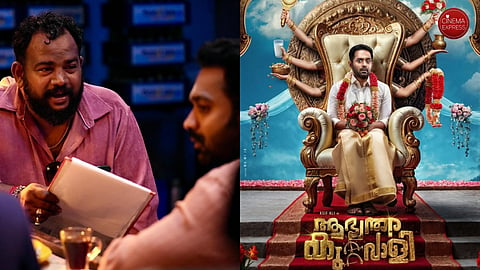

The recently released trailer of Asif Ali's Aabhyanthara Kuttavaali begins with the dialogue, "Section 498A was designed to protect women, not to ruin men's lives." The law introduced in 1983 to address cruelty and harassment in marriage has often been criticised for being misused to settle personal scores between couples and their families.
Director Sethunath Padmakumar travelled with this subject for over four years, determined to debut with a film that will be spoken about. "Even though I had a few other subjects, I persisted with this one as I wanted my first film to be special. I wanted people to discuss it because it's a common issue today. I completely agree that 498A has been instrumental in protecting women's rights and bringing down domestic violence, but there's also another side to it. Are all these cases genuine? What happens to a person who is wrongly framed in such a case? These are some questions we are trying to put forward with this film."
Sethunath, who comes from an MBA background, assisted in a handful of films—starting from Ishq (2019) to the web series Masterpeace (2023)—before choosing to take the big leap as an independent director. Yet the journey to make his first film was not easy, he says. Despite several examples of such legal provisions being misused by women, Sethunath recalls it was not easy for him to get the project greenlit. "It has been a four-year-long struggle to get here. I'm not attempting something fresh with this film. It's based on incidents that are already out there in the public. Yet people were hesitant to back it. Many suggested that it would be easier for me if the story is told from the other perspective." The director, though, clarifies that he is not trying to side with any gender. The primary intention, he adds, is to invite discussions on a pertinent issue. "I'm showing this story from Sahadevan's perspective, but without taking sides. I prefer leaving it to the viewer's judgement. It's up to them to decide if Sahadevan or his wife Nayana was right."
While Aabhyanthara Kuttavali is told from Sahadevan's point of view, Sethunath says it's not just one person's story. Sidharth Bharathan and Harisree Ashokan also play key characters who are entangled in the complexities of marital discord and subsequent legal disputes. "There are many Sahadevans around us. It's a film about all of them. I've tried to ensure their characterisations are distinct. While sketching Peter and Makar Ikka's characters, I had certain expectations and both Sidharth Bharathan and Harisree Ashokan fit in perfectly." The film has newcomer Thulasi as the female lead. Finalised from a pool of 3000 entries, after multiple rounds of auditioning, Thulasi's casting was crucial as Sethunath wanted to eliminate the preconceived notions associated with a familiar name. "The freshness was important as the audience would otherwise start making predictions about where the story is heading," notes the director.
Aabhyanthara Kuttavali is gearing up for release at a time when Asif Ali is in red-hot form. With the actor right in the midst of a flourishing purple patch, Sethunath feels the pressure to deliver. "On the final day of our shoot, Asif bro said, 'I'm very happy that Sethu's film is coming out during the best phase of my career.' That shows his trust in me, so I wouldn't want to fail him. I hope Aabhyanthara Kuttavali makes the same impact his last few films have had." Sethunath recounts approaching Asif for Sahadevan's role after being impressed by his performance in Kettyolaanu Ente Malakha (2019). "Sleevachan was nothing like the Asif we had seen before and I still believe that's his best performance to date. I got to know him better while working as an associate director in Mahaveeryar (2022). During a casual talk when I told him about Aabhyanthara Kuttavali, he got curious about the title and its basic idea. After a couple of months, I narrated to him the first draft and since then, we've been travelling together with it."
As the release date closes in, Sethunath is both nervous and curious about the audience's response. "I don't have any tall claims to make apart from the fact that we have made a socially relevant film. More than anything, I'm eager to see how it will engage the audience. I hope the film leads to some much-needed conversations."